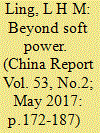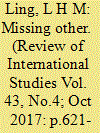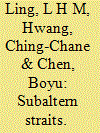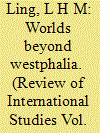|
|
|
Sort Order |
|
|
|
Items / Page
|
|
|
|
|
|
|
| Srl | Item |
| 1 |
ID:
153118


|
|
|
|
|
| Summary/Abstract |
The concept of ‘soft power’ impoverishes our understanding of politics. It assumes (i) the world has never
encountered instances of ‘soft power’ before or knows no better when encountering it; (ii) culture cannot
have any interests, agency or impact of its own; and (iii) it cannot capture the state. History—especially
from India and China—debunks these assumptions. I propose a contrasting concept, cultural power.
It turns ‘soft power’ on its head by (i) articulating the state as ontology, not instrument; accordingly,
(ii) culture can generate its own centre (or centres) of gravitas that (iii) invariably outstrips the state in
purpose and identity. To demonstrate, I draw on recent filmic representations from India and China.
These replay the power of historical culture, like Hindu reincarnation and/or Confucian love, through
a contemporary venue. I conclude with some implications of cultural power for politics, in general, and
world politics, in particular.
|
|
|
|
|
|
|
|
|
|
|
|
|
|
|
|
| 2 |
ID:
150526


|
|
|
|
|
| Summary/Abstract |
In White World Order, Black Power Politics: The Birth of American International Relations, Robert Vitalis presents a critical disciplinary history of the field of international relations, and the discipline of political science more broadly. Vitalis argues that the interconnections between imperialism and racism were “constitutive” of international relations scholarship in the U.S. since the turn of the 20th century, and that the perspectives of a generation of African-American scholars that included W. E. B. Dubois, Alain Locke, and Ralph Bunche were equally constitutive of this scholarship—by virtue of the way the emerging discipline sought to marginalize these scholars. In developing this argument, Vitalis raises questions about the construction of knowledge and the racial foundations of American political development. These issues lie at the heart of U.S. political science, and so we have invited a range of political scientists to comment on the book and its implications for our discipline.
|
|
|
|
|
|
|
|
|
|
|
|
|
|
|
|
| 3 |
ID:
075661


|
|
|
| 4 |
ID:
161570


|
|
|
|
|
| Summary/Abstract |
Westphalian international relations (IR) entrenches us in dichotomized deadlocks like ‘China’ versus the ‘West’. To break out, we need to emancipate IR spiritually, not just analytically, politically, or even ethically. By this, I mean an open mind and heart when encountering difference through others. Epistemic compassion epitomizes this process. Two pre-Westphalian traditions provide a means and an example: advaita monism and daoist trialectics.
|
|
|
|
|
|
|
|
|
|
|
|
|
|
|
|
| 5 |
ID:
059242


|
|
|
| 6 |
ID:
155152


|
|
|
|
|
| Summary/Abstract |
As Andrew Linklater has shown, Europeans have decreased their tolerance for, or endorsement of, violence over the centuries. Various international and domestic conventions demonstrate the point. This accomplishment rightfully deserves celebration. But herein lies the rub. While Linklater recognises the role of imperialism and colonialism in perpetrating global violence, he does not grant equal opportunity to the Rest in contributing to the world’s new moral heights. Linklater assumes, for instance, that Las Casas never talked with indigenes to realise that they, too, warrant recognition as human beings; Catholic piety alone sufficed. The West thus towers in singular triumph, embedding International Relations (IR) in what I call Hypermasculine Eurocentric Whiteness (HEW). Still, the Other retains a sense of its Self. An effervescent spirit of play enables resilience and creativity to co-produce our world-of-worlds. Come out and play!, I urge. It’s time to shed IR’s ‘tragedy’ for the sparkle within.
|
|
|
|
|
|
|
|
|
|
|
|
|
|
|
|
| 7 |
ID:
168767


|
|
|
| 8 |
ID:
053510


|
|
|
| 9 |
ID:
093856


|
|
|
|
|
| Publication |
2010.
|
| Summary/Abstract |
Mainstream approaches perpetuate the Taiwan-China 'crisis'. They do so by following Cold-War concepts and prescriptions, despite the rise of new realities and new visions for cross-strait relations. We draw on Hirschman's identification of 'loyalty' and 'voice' to describe the mainstream discourse on cross-strait relations in Taiwan, mostly directed by the United States. But a third option is now emerging. It offers the possibility of a paradigmatic breakthrough or 'exit' based on articulations of a postcolonial subjectivity for Taiwan and its relations with China.
|
|
|
|
|
|
|
|
|
|
|
|
|
|
|
|
| 10 |
ID:
153673


|
|
|
|
|
| Summary/Abstract |
Racism reflects how we think and act as much as what. It manifests in terms of biology, geography, and culture but reflects an episteme that normalises Self and Other into a bordered binary. Here, a trialectical epistemology can help. It dissolves racialised realities by showing how opposites exist in each other, thereby constituting a three-ness – e.g. self-in-other and other-in-self – that links Self and Other despite mutual antagonisms. From such trialectics, epistemic compassion can arise. It enables learning from the Other through what Buddhists call ‘interbeing’ or the recognition that ‘you are in me, and I in you’. Reciprocity thus becomes key. The Self cannot violate the Other without also violating itself; likewise, loving the Other effectively loves the Self. Flat, monochromatic binaries like ‘black’ versus ‘white’ cannot continue and colour revivifies world politics, both literally and figuratively. I apply trialectics to the ‘border problem’ between India and China as an analogy.
|
|
|
|
|
|
|
|
|
|
|
|
|
|
|
|
| 11 |
ID:
120473


|
|
|
|
|
| Publication |
2013.
|
| Summary/Abstract |
Discourse in the US/West that a rising China threatens world order serves no national interest or international purpose. It subscribes only to Westphalian anxieties about the Other. Drawing on Daoist dialectics, this article shows how we can reframe this issue by revealing the complicities that bind even seemingly intractable opposites, thereby undermining the rationale for violence. By recognising the ontological parity between (US/Western) Self and (Chinese/non-Western) Other, we may begin to shift IR/world politics from hegemony to engagement, the 'tragedy' of great power politics to the freedom of discovery and creativity.
|
|
|
|
|
|
|
|
|
|
|
|
|
|
|
|
|
|
|
|
|